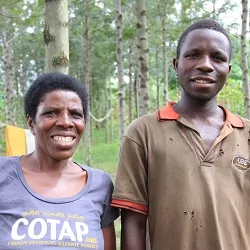Cryptocurrency’s Carbon Footprint
It’s well-established that many cryptocurrencies in general, and Bitcoin in particular, are energy intensive to create. Most crypto activity and value is currently centered around Bitcoin, which is predominantly mined in China, and primarily using electricity generated by coal. Even when mining is powered by renewables, it still causes problems by pushing communities’ electricity rates through the roof, spurring changes in state regulations and building codes.
Only Donate Crypto To Us if You Already Own It!
COTAP only seeks cryptocurrency donations from those who already own it and are already looking to donate it.
We are not contributing to crypto’s carbon emissions, as discussed below. By contrast, we’re creating a new, unique, and compelling mechanism for crypto owners to directly donate it to offset carbon emissions. Before, you’d either have to first sell it and incur capital gains taxes, or you’d have to set up a donor advised fund (DAF).
It’s also important to note that this decision goes far beyond climate and carbon. It was also based on the fact that donors will likely find us to be a compelling option because crypto essentially sits at the intersection of wealth and carbon emissions, and COTAP sits at the intersection of not only carbon emissions abatement, but also poverty alleviation.
We Didn’t Go Looking for Crypto, Crypto Found Us
In April 2021, we received a generous donation via a DAF. When we reached out to the donors (a couple) to thank them and learn why they chose us, they told us they’d donated Bitcoin to their DAF and then made donations from there. So, we’d begun “doing crypto” unintentionally! Because we’d received many anonymous DAF donations before this one, it’s possible we’d indirectly accepted crypto even earlier.
Then the question becomes… do we send the money back? If we did, would that reverse the environmental damage caused by the mining of this Bitcoin? Of course not. Not only that, but the funds would just wind up being donated to another nonprofit, and probably one whose mission has nothing to do with climate change. The most important question is, “Did these donors go out and obtain/mine Bitcoin for the purposes of donating it to COTAP?” Extremely unlikely. Accordingly, COTAP’s acceptance of cryptocurrency doesn’t result in new or “additional” crypto-related CO2 emissions, as discussed below.
“Additionality” & COTAP’s Role in Crypto’s Carbon Emissions
A core concept when evaluating carbon credit quality is what’s known as their “additionality.” Additionality means that a carbon removal (e.g. tree planting) or avoidance project (REDD+, avoided deforestation) would not be financially viable absent the financing mechanism of carbon credits. So, reforestation on public land as part of a compulsory national tree planting scheme is not additional. A forest protection project inside a legally protected area or national park, where logging is prohibited, is not additional. As with anything, there are complexities, exceptions, and edge cases but you get the point.
Applying the logic of additionality to COTAP and cryptocurrency, the question becomes something like “does COTAP’s acceptance of crypto drive demand for crypto and/or result in additional crypto mining?” The answer is no. That’s why we’re only interested in crypto specifically from those who already have it and are already looking to donate it.
An Imperfect but Correct Decision
So in theory, should a climate mitigation nonprofit accepting crypto be considered hypocrisy, duplicity, heresy, etc.? That’s a very fair point, but it’s also important to note that the carbon/climate piece is half of why COTAP exists. The other half is poverty alleviation and vulnerability reduction, not unlike Save the Children and World Vision. Both take in over $500M in annual donations… and they accept cryptocurrency.
Again, COTAP is only interested in crypto donations from those who already have it and are already looking to donate it, and that doesn’t result in new environmentally-damaging cryptocurrency mining.
That said, we’re also not completely innocent and blameless here. Our decision doesn’t reduce the legitimization and acceptance of crypto; our decision could be rightly characterized as a missed opportunity to be a purist/activist and lead by example – swearing off crypto because of its contribution to climate change.
When navigating complicated decisions like this, it’s important to remind ourselves of our missions and why we exist. That’s to serve our partner projects and their participating communities, some of the poorest people in the world. While the climate/carbon part of what we do is a bit fraught when it comes to crypto, the poverty alleviation part is not.
Our decision to accept crypto was binary – not a maybe or just do it a little bit, but Yes or No. By putting crypto in context and not spurring new mining activity, by realizing that not accepting crypto won’t undo its carbon emissions, and by realizing that the money would be donated anyway to other nonprofits, we believe we’ve made an imperfect but correct decision.





















